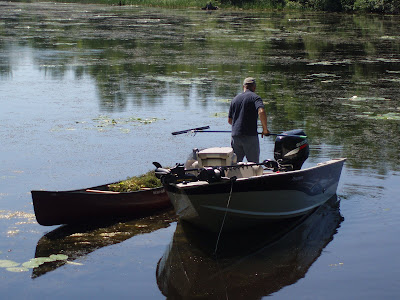
However, it propagates rapidly and crowds out other species, having especially bad effects on cattails and other shoreline vegetation. We have been pulling it when we see it. Our property owners association has started a program of introducing a beetle that eats it, and this is having good success. (I wonder, though, if we humans ever truly understand the effects of such introductions. What other unintended consequences might there yet be from the beetle introduction?)
The other plant of interest to us is called Eurasian Milfoil.

Any of you who have owned aquariums would likely recognize the plant. They have sold it for years for use in aquariums. You can read more about it at a couple of sites. One is here, the Wisconsin DNR site, and another is here, a USDA site. The USDA site has an image that you can enlarge. If you do so, you will get a good sense of what we are dealing with near our property.
What are we dealing with here? Well, for some reason, this plant has decided to take over our little bay. The picture I mention above at the USDA site is fairly typical of what we see here. All of the six or so property owners on this bay are struggling with the Milfoil. It creates a distinct odor that hovers around. Though not terrible and though breezes keep it away, it can be unpleasant. The biggest problem is the way it crowds out the lily pads and reduces oxygen levels for the fish. In addition, it makes boat traffic very difficult, as it tangles in the propeller to the point where a boat will almost not move. Most of us have been working to create paths to open water in various ways, some by simply raising their propellers to be near the surface and then "chopping" their way through. The bad thing about this is that the pieces can float away and may root elsewhere. I wrote to the DNR but haven't gotten much reassuring information. They begin by saying that owners may pull weeds as much as they like, as far out as they like, and within the permitted 30 feet of cleared shoreline. This is a reasonable, though labor-intensive, short term approach. We are discussing other remediation approaches with the neighbors and may talk further to the DNR or to an area aquatic vegetation specialist.
In the meantime, I have acquired two new "lake rakes." Both have very long handles. One has a wide cutter blade, and the other is a somewhat more traditional rake equipped with floats and ropes to enable retrieval of materials from the surface or (with floats removed) from the lake bottom. So, I've been busy removing this Eurasian Milfoil from our dock area and well out into the bay. The results have been good, so far, but you might not believe the quantity of vegetation we've had to dispose of. My spouse has been successful at burning most of it so far, but we have to let it dry first, at least partially. (I can't help but think of the hay we used to cut and dry before bailing. These plants almost have that nature to them when they are spread to dry, and the skill I acquired with a pitch fork when younger is paying good dividends now.)
Kathie took a few pictures of me at work. I tie our canoe to the boat to use to transport the weeds I pull out with the rake. Then, I remove the boat seats so that I can stand in the boat and work with the rake. Yesterday, I just about sank the canoe by filling it so full of weeds.



So far, so good. We now have a very nice, clear area around our dock. And, we are able to do some fishing in the evenings. Even though the vegetation reduces oxygen levels, there still are lots of bass and pan fish lurking around under the weeds. With the areas I've cleared, we can now fish at the edges of weed patches. Kathie caught two nice bass last night from the dock.
1 comment:
Henry's response when I told him you were raking in the water: "that's silly!"
Have you considered finding a spot to compost the waste rather than burning?
Post a Comment